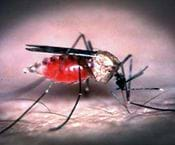Youssou N’Dour And The World Bank Join Forces To Fight Malaria Website
Today, April 25, 2008 is ‘World Malaria Day’, the day is set aside to highlight on the disease that according to some experts infects more than half a billion people yearly. It is also estimated that the disease kills a child every 30 seconds. The call therefore, to fight malaria is as urgent as ever. The World Bank has joined in the fray in a unique way together with world acclaimed musician, Youssou N’Dour to make the call for the war against malaria louder. The World Bank and its partners in the war against malaria are calling for an intense effort to eliminate malaria as a major public health problem and end the deaths that result from what they call this 'ancient disease'. This week the Bank invited Youssou N’dour to perform before African Ambassadors, Roll Back Malaria partners, the Bank’s staff, and other distinguished guests. The show afforded an opportunity to focus attention on the challenge and opportunity malaria presents for those most directly affected and those with the ability and capacity to help fight the disease. Sharing his views on the war against malaria, the world class musician said, “The world has started a war against malaria, a war we can all win. We have a grand alliance, called Roll Back Malaria. Allies like the World Bank, the Global Fund, the U.S. and the U.N. are doing more. And on the first World Malaria Day, we have presidents and even basketball players involved. The high-level attention to malaria is just what we wanted when we started the Africa Live malaria concert in 2005, but it's still not enough. Mosquitoes don't care about visas—we need cross-border efforts like the Zambezi region proposes. With efforts like that, we can eliminate malaria." Indeed, Youssou and the World Bank are acting at the right time to intensify momentum for the fight against malaria at a time when commitment from Africa and current partners is at an all-time high. The commitment shows the high hopes that all the fighters are expressing, which gives an indication that the fight can be won. Even though, malaria is treatable and preventable, a million or more people – mostly children in Africa still die from it every year. Adding her voice to the optimism towards harnessing resources to fight malaria, the World Bank Vice President for Africa, Obiageli Ezekwesili said, “The good news however, is that more African countries are showing that it is in fact possible to control malaria,” adding that “despite difficult conditions and initial pessimism, countries such as Benin, Ethiopia, Rwanda, and Zambia are successfully scaling up malaria control efforts through provision of bed nets and effective drugs. Certainly more countries can follow a similar path with enough resources and technical support.” The Bank posits that critical to the success of these countries is the ability to ramp up malaria control efforts quickly and sustain the level of effort long enough to drastically reduce the number of people and mosquitoes harboring the parasite that causes malaria. Given the current immense global interest in malaria, now is the time to do it, and effective partnership is crucial to the equation. The United Nations Special Envoy for Malaria, Ray Chambers said, "The malaria community is in a better place than ever before. The Roll Back Malaria Partnership is working to produce unprecedented collaboration. People on the ground and at the global level are excited about the prospect of ending deaths from malaria.” Being more poignant he added, "We know what to do; now we just need to get it done." To do what must be done however, requires more funding. And the World Bank since the 2005 launch of its Booster Program for Malaria Control in Africa, has committed US $467 million to malaria prevention and treatment in Africa, making it one of the top three funders of malaria control. This funding has been requested by African countries to buy long lasting insecticidal nets (LLINs), effective drugs, and supplies for spraying the walls of homes with insecticide. It also includes money to strengthen health care systems so that they can better manage the life-threatening malaria cases that can consume up to 40 percent of public health resources in heavily-affected countries. It appears malaria is one of the negative factors hindering Africa’s development and that was captured more in Professor Awa Marie Coll-Seck’s remarks. Prof. Coll-Seck is the Executive Director of the Roll Back Malaria Partnership. She said, "Defeating malaria is essential to Africa's development,” and she emphasized that "In addition to making people physically miserable, malaria reduces productivity. When adults-or their children-are sick with malaria, they lose time from their work, which means they cannot produce the food, money, or other things they and their countries need." She added, "Unless malaria is tackled in Africa, few countries there will meet the five key Millennium Development Goals on child health, maternal health, infectious disease, universal primary education, and the eradication of poverty. Malaria must be stopped, and the world is now poised to achieve this goal." In the light of these facts, it has even become more imperative, that strategies for addressing the prevailing world food crisis, should factor the fight against malaria in its approach since the disease’s effect on the continent’s human resources, if not curtailed can have devastating effects on the continent – majority of whose people depend on agriculture.
Source: MJFM








